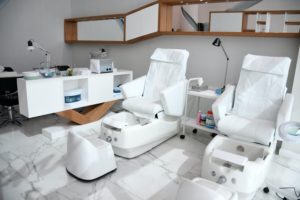Medical Spa Laws: How to Protect Your Practice
Medical spa procedures, combining medical treatments and spa care, are an increasingly popular comprehensive service in the healthcare industry. A medical spa’s mix of offerings appeals to those seeking minor cosmetic changes and overall skincare.
Due to increasing demand, some medical spa practices can bring in over $1.5 million annually. For medical professionals, med spa treatments are a great opportunity to provide care in a new and exciting environment. But do not let the title confuse you, practices must still adhere to strict medical spa laws and regulations.
Who Can Own a Med Spa?
While a medical spa may employ a licensed esthetician for med spa treatments or other medical professionals, the owner must be a physician if the establishment is offering medical treatments.
In accordance with California Business and Professions Code section 2400 within the Medical Practice Act, “Corporations and other artificial entities shall have no professional rights, privileges, or powers.” Therefore med spas must be owned by physicians and not other entities. However, non-physician licensed healthcare professionals (such as RNs and PAs) may be able to own a minority interest in a medical corporation along with a physician(s).
An attorney can provide legal guidance on the formation of the practice and ensure all proper paperwork and licensing requirements are completed.
What Med Spa Treatments Can Be Offered?
Physicians or other licensed medical professionals offer medical-related services including but not limited to:
- Microdermabrasion
- Botox
- Laser hair removal
- Hair replacement
- Coolsculpting
- Liposuction
- Scar revisions
- Vein treatments
- Dermal filler injections
Treatments like these, while viewed as cosmetic, require proper medical certification. It is critical that the practice is owned and certified, and that the person administering the treatment is a physician or other medical professional licensed to do so.
For some treatments, a nurse practitioner or physician’s assistant may be qualified to perform the procedure under supervision. Supervision may vary from onsite to indirect supervision but all practices must establish a proper policy with legal documentation.
Even though it is a medical spa, medical professionals still hold the burden of offering the same care and diligence they would in a practice.
Medical spa treatments may also provide complementary services such as:
- Acupuncture
- Dermaplaning
- Facials, including some non-invasive acne treatments
- Massages
- Wraps
Estheticians may perform non-medical treatments depending on the offerings of the med spa treatment. Their license must be approved by the California Board of Barbering and Cosmetology.
Regardless of the treatment, patients must be properly informed of their caregiver and their credentials.
Physician Responsibility
When performing medical spa treatments, the physician has a responsibility to ensure the patient is fully informed and consents to the procedure. Following the doctrine of informed consent in case law, patients should aware of the nature of the procedure, any risks, complications, or benefits associated with it, and any alternative treatments, including no treatment.
In California, Botox and other similar cosmetic procedures offered as med spa treatments are considered prescriptions. Because of this, physicians, physician assistants, or advanced nurse practitioners must legally provide a good faith examination of the patient before providing the service. In a good faith examination, the physician will physically and thoroughly assess the patient as well as refer to their medical record to determine if the patient is fit for the procedure.
Physicians ultimately bear the responsibility of patient care. It is important for physicians to have emergency plans in place in case of mishaps or complications.
HIPAA
Medical spas employees are also bound to the HIPAA statute. Patients identifying information must be kept private and protected including:
- Paperwork
- Name
- Photo
It is advised medical spas consult a legal professional to ensure their compliance with security and privacy requirements.
Other Requirements
Physicians must also adhere to legal requirements regarding the proper advertisement of services. In all advertisements for medical services, physicians must be listed by name or the name for which they have a fictitious name permit, even if the nurse will be performing the service. Advertisements must follow California law as outlined in the Business and Professions Code.
Legal Advising on Medical Spa Laws
Medical spas are a growing trend within the medical industry, and many physicians don’t realize they have to adhere to strict guidelines and regulations. When establishing a practice it is important to be aware of the complex medical spa laws and regulations.
Fenton Jurkowitz Law Group continues to represent physicians, medical groups, and other healthcare providers. The firm’s practice includes attorneys dedicated to med spa compliance who will work with you to ensure your facility is operating correctly, and protect you from breaching state and federal laws.
If you already have a medical spa facility or are considering opening one, message us or call us for consultation.
